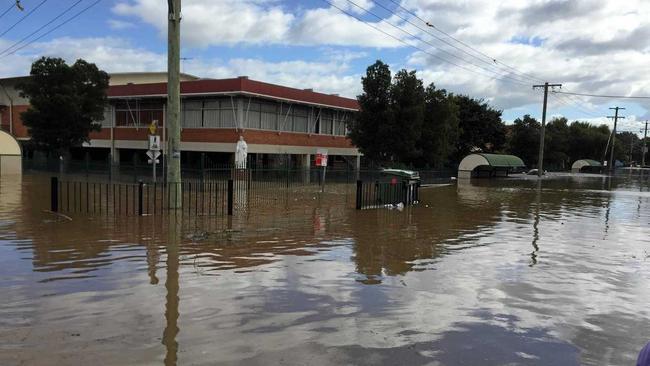Health risks posed by possible floodplain soil contamination
"I think in terms of harm and health risk, I am sure that there are areas that are hotspots other than what we've looked at," expert says.

Lismore
Don't miss out on the headlines from Lismore. Followed categories will be added to My News.
ON the surface, Lismore's post-flood clean-up may seem like it was completed months ago.
However, beneath the surface, masked by green grass, lurks a potential health hazard that signifies the clean-up is far from over.
Unidentified hotspots of soil contamination throughout the town's floodplain may elevate health risks for residents and business owners, experts have warned.
The warning comes after testing at Trinity Catholic College revealed some hotspots at the school's campuses were about 20 times higher than guidelines set by the Environmental Protection Authority.
Some of those hotspots tested at the school contained contaminants such as polycyclic aromatic hydrocarbons (PAH), which occur naturally in fuel, coal and crude oil products. PAH doesn't break down naturally like other contaminants, meaning soil areas containing high amounts of PAH like those found at Trinity, need to be removed or covered with concrete.
Based on its work at the school, Ecoteam chief executive Keith Bolton said his team could extrapolate that "pretty much anywhere within the floodplain is going to have flood-borne contamination".
"I think in terms of harm and health risk, I am sure that there are areas that are hotspots other than what we've looked at," Dr Bolton said.
Lismore City Council was notified of the findings at Trinity by Ecoteam.
The council's compliance coordinator, Matt Kelly, said council would address anything in public spaces it identified that "has had a significant impact" and that the council could investigate concerns raised by the community.
Scientists help clean up flood contaminated school site
Health and welbeing important post flood
"In flood events you get a lot of diffuse pollution and unfortunately it's not possible for the council to track specific hotspots following a catastrophic deluge of the kind we saw in March," Mr Kelly said.
He also said the council would work with private property owners if they need help and advice about possible contamination.
An EPA spokesman said any evidence of any contamination post-flooding warrants assessments "to determine the level of risk posed by the contamination and inform the need for any remedial strategies".
"Upon receipt of any such evidence the EPA will work with the local council to ensure that appropriate assessments are conducted," the spokesman said.
Dr Bolton said while the unidentified hotspots may be within the EPA's guidelines, he didn't rule out the possibility some could be above the set limits that could prove a health risk if exposed in the long term.
Ecoteam managing director Lise Bolton said those most at risk were residents in the floodplain who had very young children or a vegetable garden or chooks.
Mrs Bolton said the chances of adverse health implications were heightened for those growing and consuming food in possible hotspot areas or children playing in the backyard who may consume the soil.
The pair recommended residents or businesses, who are concerned about soil contamination, should get their grounds tested.
Trinity Catholic College principal Brother John Hilet, said he was surprised more testing hadn't been done.
"We have conversed and observed that we have been puzzled that there hasn't been more testing being done around the area," Br Hilet said.
For Dr Bolton, he said the message moving forward should be raising awareness about flood contamination and the implementation of strategies to negate the risk.
He suggested storing fuel barrels and other chemicals, like cleaning products, out of reach from flood waters and comprehensive procedures to prevent oil spills at fuel stations as some measures to reduce the spread of contamination during floods.
If anyone has any evidence of contamination contact the EPA's Environment Line on 131 555.


